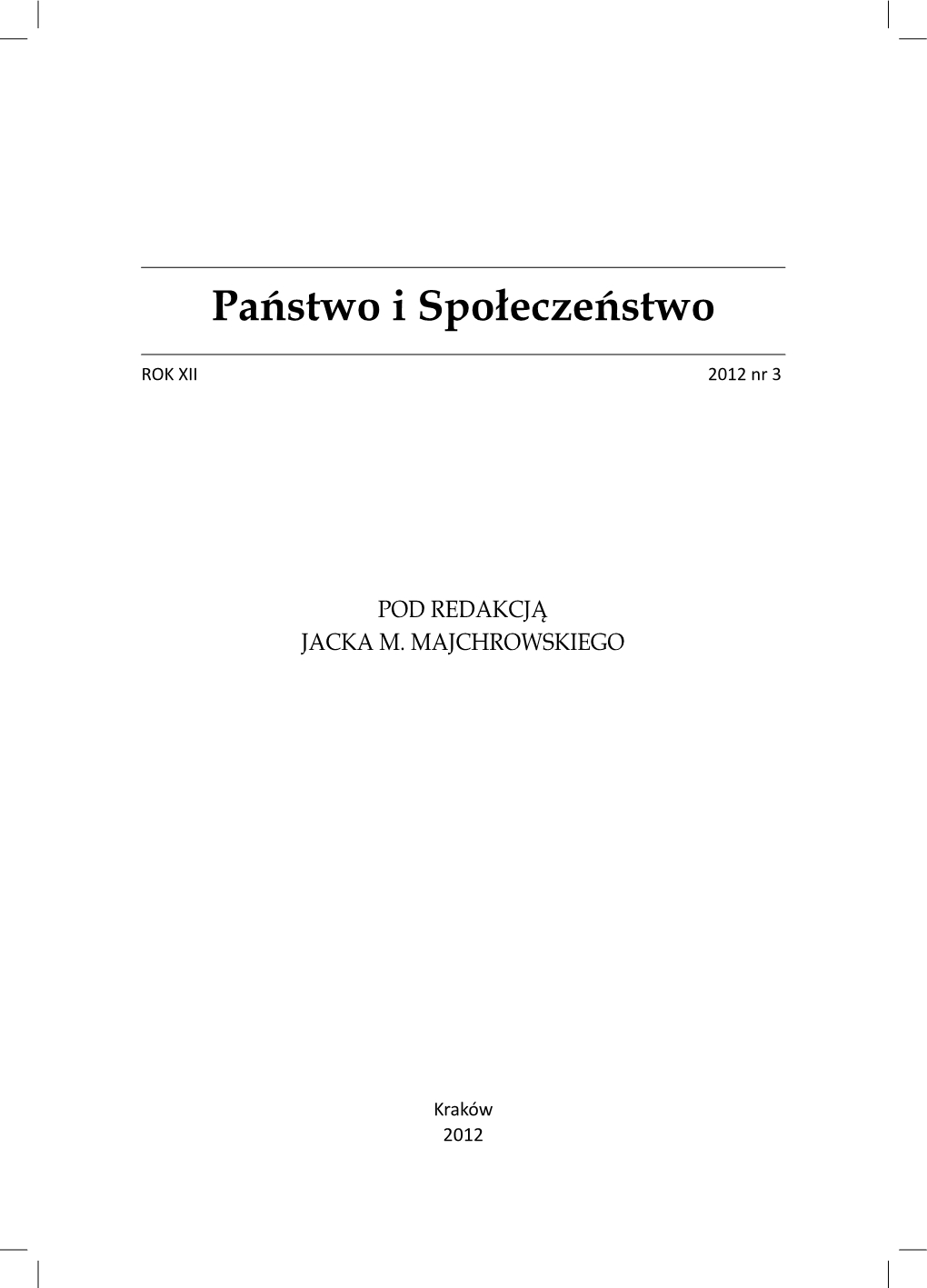
We kindly inform you that, as long as the subject affiliation of our 300.000+ articles is in progress, you might get unsufficient or no results on your third level or second level search. In this case, please broaden your search criteria.

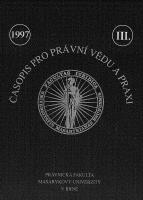
The topic of the article are some aspects of the principles of legality, adequacy and efficiency of criminal law, their mutual relations and question of their meta-legal justification. The author is asking about the way these principles as a whole are connected with the demand of just application of criminal law. The article indicates the possible attitudes to these principles in clasical theories of punishment (absolute, relative, mixed). The problem of capital punishment and "extraordinary" punishments is mentioned as well. The author emphasises the importance of meta-legal, mainly moral and political argument for the defence of individual approach to punishment. He deals with the Barata's conception of criminal law and criminality as the results of social oppresion. The author claims that refusal of such theories must be based on unambiguous social agreement concerning the values, which the criminal law is to defend.
More...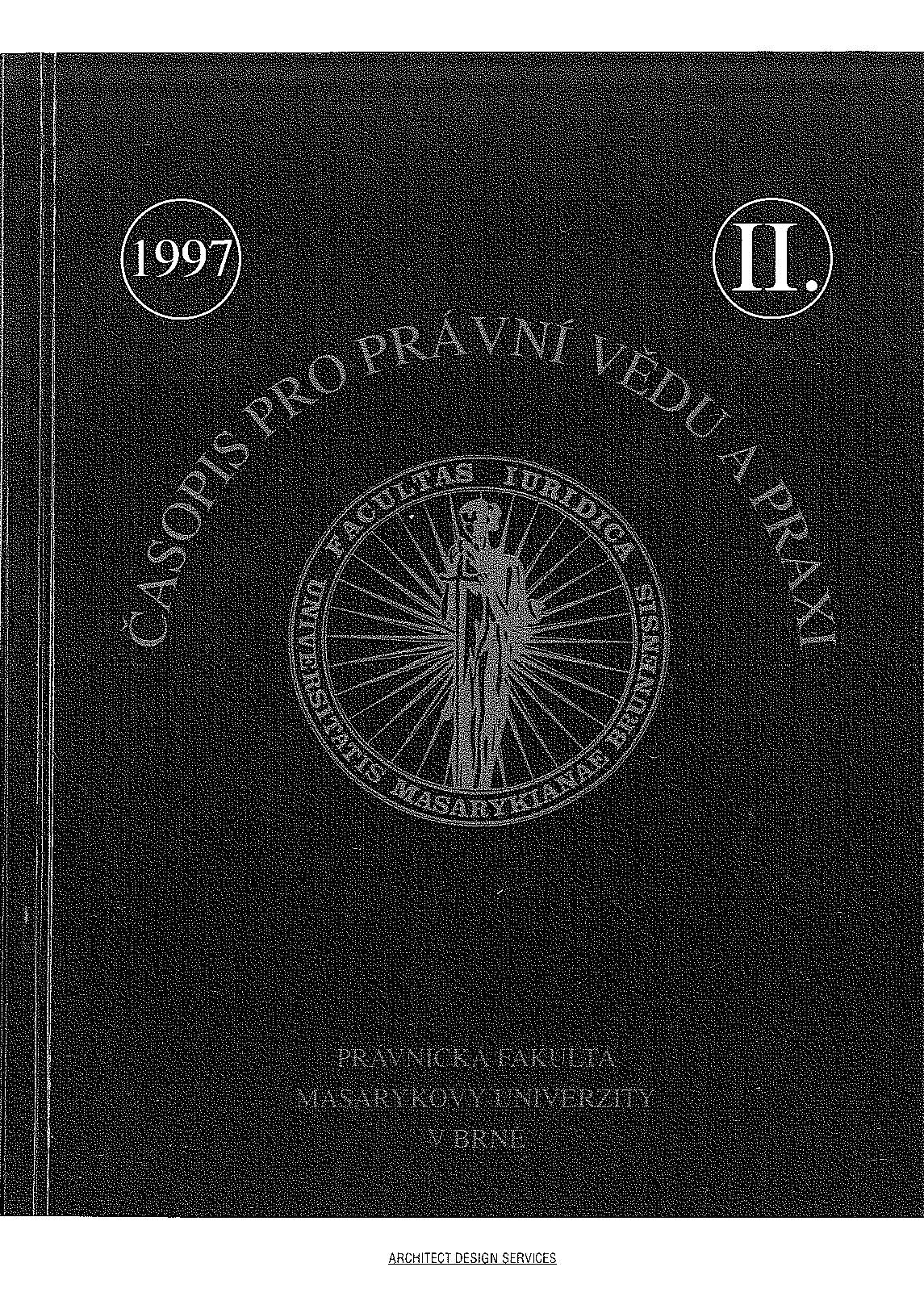
The article explores the nature of arguments and argumentation within legal theory and practice. It emphasizes the importance of understanding the true meaning of "argument" and "argumentation" to ensure reliable legal conclusions. The paper delves into the logical analysis of arguments, distinguishing between genuine arguments and mere assertions. It also examines the historical and philosophical roots of these terms, highlighting their varied applications in different contexts. The study underscores the role of rhetoric in legal argumentation, tracing its origins to classical figures like Cicero. Additionally, it discusses the practical and theoretical dimensions of argumentation, including its use in legal reasoning and decision-making. The article concludes by stressing the need for precise definitions and applications of arguments to enhance the credibility of legal judgments.
More...
From the former commentory are evident our sceptical attitudes to the ideas of John Rawlse. The Rawlse s moral explanation of the welfare state and its full realization is not expected to come true. On the other hand we mentioned the ideas of Hayek as an example of another extreme which we also do not endorse as his principles could not work in the society without large and permanent commotions. We find the way out of this situation in the philosophy of David Hume. Hume justified the origin of the society by the mutual sex instinct that keeps people together before there is a new bond for the care of the offsprings. Except this he believes that we wilf obey certain rules (e.g. the inalinable right to property). He justified the function of these rules by an alfegation about the rule of law. We have got the chance to live in a society that is more conveniant for us because the effort of an individual is consumed by providing for various things that man needs for the necessities of the life and that is why he can never be perfect in any activity. This leads us to the conclusion that it would be incorrect to give up trying for the maximal justice in the limits of the "healthy brain". After alf the fegislators of alf civilized countries of the world can know this and they put it into practice. The basic principles of the social justice are also in the benefit of richer stratums of the population (it menas the higher and the middle classes) that want to avoid the social conflicts that in its final consequentions are not profitable for any of the social stratums. Therefore the current topic is to find out: "Where does the maxima! justice end in the limits of the healthy brain?".
More...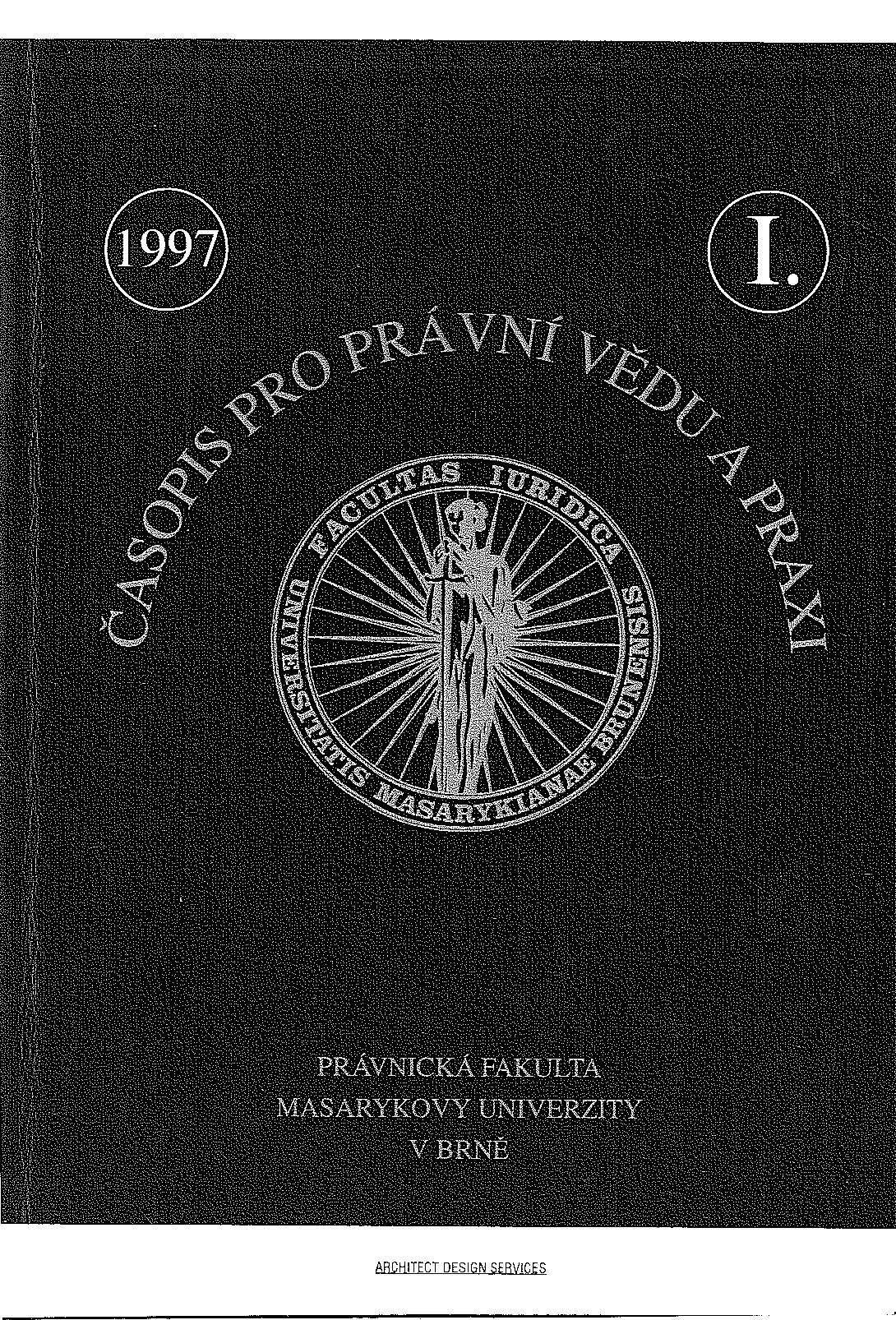
The article by JUDr. Jan Spáčil discusses the relationship between positive law and natural law, focusing on the concept of "super-positive" law. It examines the dual nature of sovereignty in a democratic state, distinguishing between constituent power (pouvoir constituant) and constituted power (pouvoir constitué). The complexity of these issues lies in the intertwining of political and legal questions. The article critiques the views of various scholars, including Prof. V. Klokočka, who argues that positive law should be subordinate to natural law. Spáčil emphasizes the importance of integrating natural law principles into positive law through formal legal processes. He also highlights the role of legal practitioners in interpreting and applying these principles within the framework of existing legal norms. The discussion underscores the need for a balance between legality and legitimacy in the application of law.
More...
Social justice has been changed into widespread and quite efficient argument in of political discussion. It became a key-principle of social policy as a specific cifort saciety to preserve or establish the rule of equal opportunity as a form of social justice. The task of this article is not to find out what the justice is and what should one's approach to it. The author tries to project the problem as such and to arise reader´s interest in this interesting and important issue. However, social justice is an unattainable ideal that can hardly be reached.
More...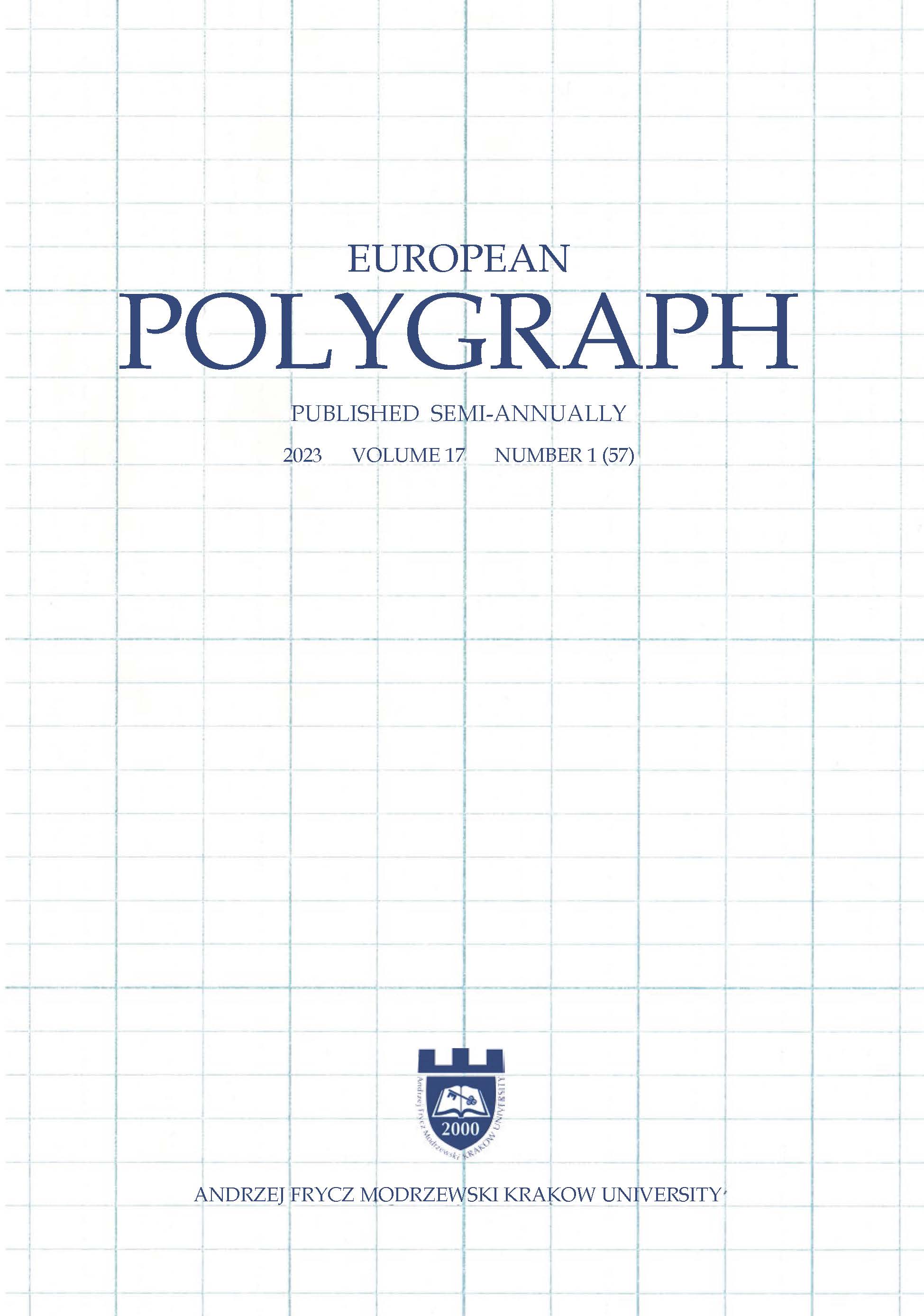
In polygraph history, Cleve Backster’s “numerical scoring chart analysis” is considered as revolutionizing the manner of polygraph charts analysis. Yet, earlier history of chart analysis, as being reviewed in this publication, lead to the conclusion that the “numerical scoring chart analysis” was more evolutionary rather than revolutionary.
More...
In Latin America, the investigative interview is still in its beginnings. Currently, most public and private investigators use interview and interrogation techniques aimed at obtaining admission or confession, instead of applying Investigative Interview techniques focused on information gathering. This document provides an overview of the Conversation Management Approach. This is an investigative interview technique used to interview uncooperative criminal suspects, such as those accused of feminicide. An example of how to apply the technique in a case of feminicide is shown, to serve as a guide to good practices. This technique consists of three phases that must be considered when administering and applying the interview. In the first, the behavior before the interview is reviewed, in which the planning and preparation of the interview was carried out. The second phase is the interview to elicit information, which consists of a variety of questioning style techniques, explanation of procedures and instructions to follow, rapport building, and clarifi cation of information. The third phase is called the post-interview phase, which consists of closing and evaluating the entire interview process. The objective of this work is to provide Latin American interviewers with information on the best practices in investigative interviews used in other countries, to raise their aware of the need for training in this area. The correct application of investigative interview techniques is essential to investigate crime, and training of interviewers in this type of technique is necessary to improve the results obtained through interviews.
More...
The authors of this article consider the advantages of using a visual version of CIT during polygraph examinations. The presentation of the rarely used CIT encourages to discussion about the possibility of implementation such tests in serious criminal cases. Their application takes a form similar to the police lineup. However, the main difference is that the suspect reviews photographs of possible crime victim. In the described case we are dealing with a so-called “reverse police lineup”. As the result, the visual CIT proved that the examinee knew the victim of the crime, despite the fact that he had previously denied this. Thanks to the examinee’s arousal recorded on the key question, it was also possible to obtain the desired psychological effect in the form of the perpetrator’s confession and the indication of other evidence proving his guilt.
More...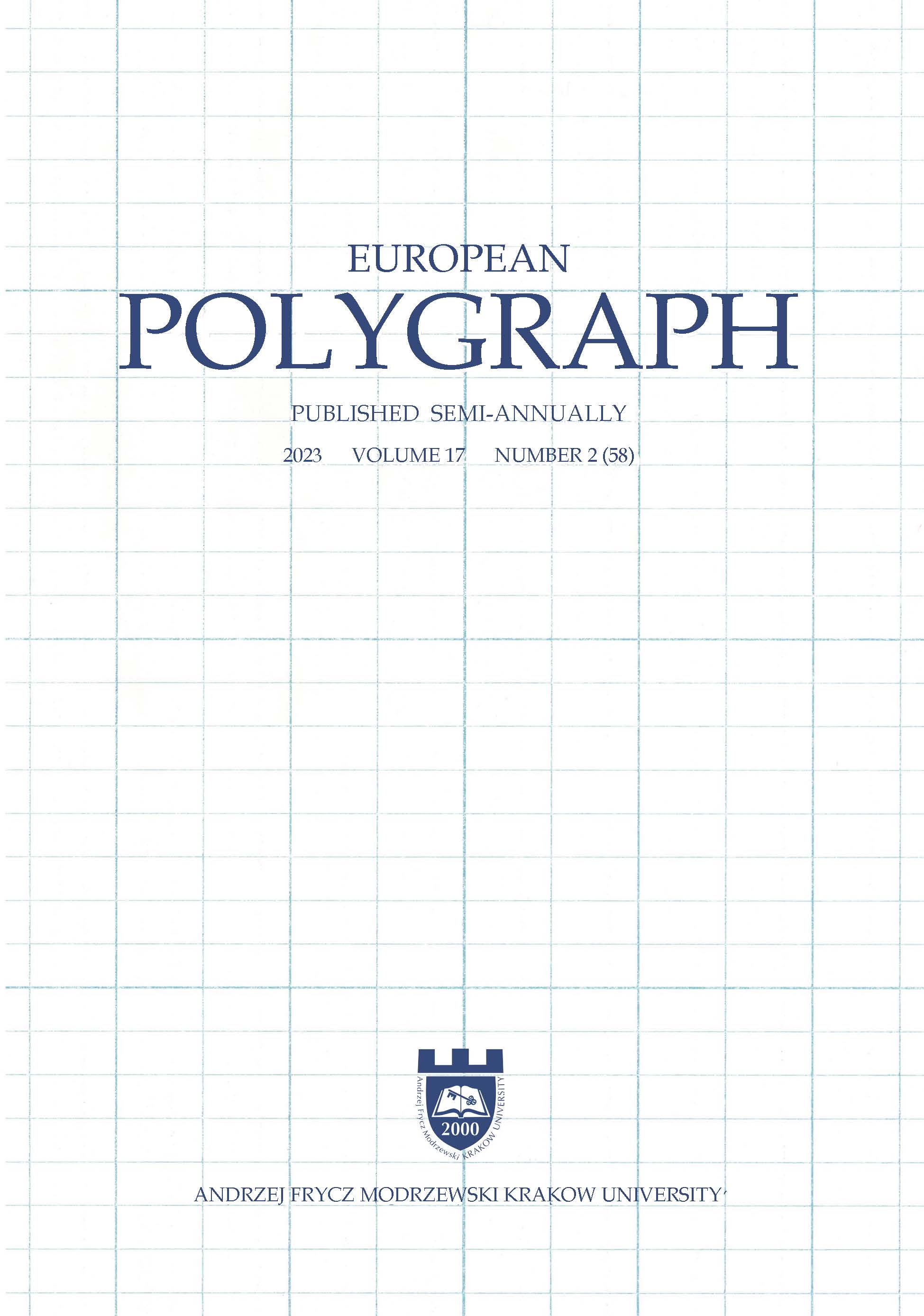
Since the first edition of this reference was published 25 years ago much has taken place in the polygraph field, progress which has continued in the decade since the last edition of the Terminology Reference. The transition from analog to digital polygraph is now complete, the polygraph profession has accomplished the shift from authority-based practices to those that are evidence-based, concepts and terms adopted by the polygraph field are substantially more mainstream, new credibility assessment technologies have appeared while others have disappeared, and much to the surprise of critics and detractors, predictions of the demise of the polygraph have proven to be premature. In this fourth edition of the Terminology Reference for the Science of Psychophysiological Detection of Deception we strived to capture these changes. We have updated the references, added new terms, removed others, and included images for some terms to help readers understand them better. We hope readers appreciate these updates. And finally, we sadly report the passing of our friend, colleague and contributor to previous editions of this work, Shirley Sturm in 2020. Shirley was one of the greats in the polygraph field. She was the first woman President of the American Polygraph Association, a teacher, a coveted mentor, and a fiercely independent thinker. We and the rest of the polygraph field will miss Shirley, her sense of humor, her passion for polygraph, her concern for her fellow practitioners, her commitment to the field. There was always only one Shirley Sturm and we were fortunate to have known her. Because of her lasting contribution to our shared field of endeavor we dedicate this edition of the Terminology Reference to Shirley Sturm.
More...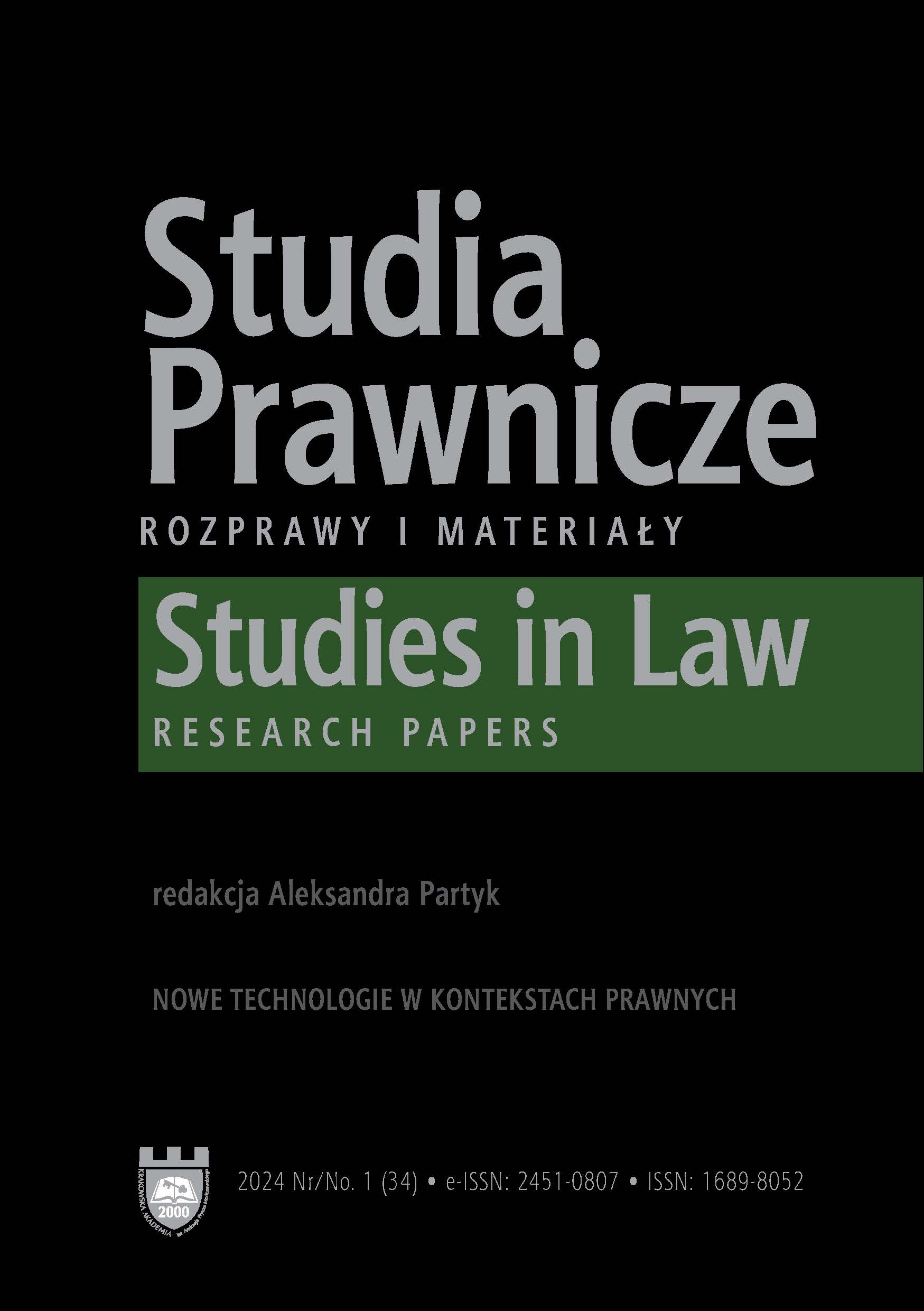
The author describes the institution of conversion of court proceedings to arbitration, which was added to the Code of Civil Procedure in 2023. The article identifies the advantages and disadvantages of this solution both dogmatically and from the perspective of time and financial efficiency for business. The author also poses the question of the impact of the introduction of conversion on the popularisation of arbitration in Poland. Moreover, whether only the initiative of the legislator and the executive power has an impact on the promotion of the idea of arbitration.
More...
Some concepts discussed in the field of religion have been the subjects of more than one discipline; and these concepts have been studied from different perspectives in each discipline. Literal meaning and metaphor, which have an important place in understanding the religious rules (religious nas), are such concepts. Although literal meaning and metaphor seem to be solely linguistic concepts, they have substantially become the subjects of many religious disciplines. Jurisprudence methodology is one of the basic religious disciplines that intensively use these concepts. Although there was no definition of metaphor in the early language sources, it has been generally accepted as "the use of words other than the meaning given in the language". Imam Shafii (d. 204/820), the author of the first work of Islamic jurisprudence methodology that has survived to the present day, and Jâhız (d. 255/869), Abu Ali al-Jubbâî (d. 303/916) and Abu Hâshim al-Jubbâî (d. . 321/933) also used metaphor without defining the concept while basing their views. Two definitions about metaphor were narrated from Abu Abdullah al-Basrî (d. 369/979-80), one of the kalam methodologists, and who first made a definition of metaphor. Although the definitions made by Abu Abdullah had a significant impact on the definitions of later jurisprudence methodologists, his close methodology scholar followers did not accept these definitions. While Jessâs (d. 370/981)and Bâqillânî (d. 403/1013), made a simple definition that does not include intellectual considerations, Abū l-Ḥusayn al-Baṣrī (d. 436/1044), one of the Mu'tazila methodologists, developed a complex definition that includes theological considerations regarding metaphor. In his definition, Abū lḤusayn first pointed out that the type of address is one of the basic determining factors in order to reveal that the word is used in a metaphorical sense. In his definition, Abū l-Ḥusayn, secondly, pointed out that the metaphoric meaning of the word, as well as its literal meaning, is made within the linguistic rules. In addition, although Abū l-Ḥusayn did not express it clearly in his definition, in his evaluations within the framework of the subject, he emphasized that the presumption is one of the main determining factors in order to reveal that the word is used in a metaphorical sense. According to him, only if there is a presumption that prevents the use of the word in its literal sense, is the word taken to have a figurative meaning. In this study, which is about the metaphor definitions of Mu'tazilamethodologists, first of all, the metaphor definitions put forward by linguists and jurisprudence methodology scholars other than Mu'tazila in the first five centuries were examined. Then, the metaphoric definitions of Mu'tazila methodologists were evaluated. Among the metaphorical definitions of Mu'tazila scholars, the definition of Abu'l-Husayn al-Basrî, which takes into account the intellectual considerations of the school, was closely examined. Since the definition of Qâdî Abd al-Jabbar, one of the Mu'tazila thinkers, reflecting his understanding of metaphor has not survived to the present day, his views were also examined while examining Ebu'l-Husayn's definition. Thus, it was revealed that Ebu'l-Husayn's definition of metaphor, which contains intense theological considerations in the field of jurisprudence, is basically based on Qadi Abd al-Jabbar. Finally, in our study, the effect of the definition of metaphor conveyed by Abu'l-Husayn on the methodologists of other schools was also revealed. It was stated that this definition was accepted by Fakhr al-dîn al-Râzî (d. 606/1210), one of the methodologists in question, and Râzî's views within the framework of this definition were discussed on the intellectual basis of Mu‘tazila.
More...
Crowdfunding is a contemporary method of financing where an entrepreneur with a project or an idea of business finances his/her project by raising funds from the crowds through an open call made on an internet platform. This method is more of an alternative mechanism for generating financial sources, enabling entrepreneurs who do not have rich financial sources, who find it difficult to provide collateral required by traditional financial sources, and who do not have without enough experience or recognition to do business. This method has four basic types of funding; namely, donation-based, award-based, share-based and loan-based. This study aims to present the fiqhi (jurisprudential) aspects of these by addressing the crowdfunding method based on these four basic types. The research on the subject was carried out through analysis of concrete events and documents, and fiqhi judgments were attempted for each sub-topic through analysis and synthesis methods. As a result of the conducted research, the following basic conclusions were made with fiqhi justification: In donation-based crowdfunding, the support provided by the funders to the entrepreneurs is a typical act of granting. In terms of award-based crowdfunding, the practice of funding that includes intangible awards, such as sending a congratulatory or thank you card, is also an act of granting. The practice of awarding items of material value, albeit at a low level, such as hats, T-shirts and key rings, is a contingent-consideration type of granting. As for the pre-emption/presale practice, where the funder is given the right to pre-order the product to be manufactured, it is a contract for work, i.e. a contract for work. In the share-based crowdfunding, the type of partnership corporation established with the funds provided by the entrepreneur and the funders of the entrepreneurship company is joint stock equity partnership (‘inan), in which the partners share equally in the profit or loss with varying levels of tenure. In loan-based crowdfunding, the entrepreneur’s practice of borrowing from the investors and repaying without any interest is a typical loan process, but the practice of repaying the debt with the predetermined interest is a loan process with interest. Paying the debt borrowed from the investors with the shares of the company, is called istibdal in terms of fiqh, which means paying a debt not money but with something that can replace it. The istibdal terminated the debt relationship between the parties. However, due to the share taken from the company creates a relationship between the two parties. Provided that the field of activity is legitimate, in terms of fiqh, there are no problems in any of these practises, with the exception of the loan-based practice where the debt is paid with addedtional interest.
More...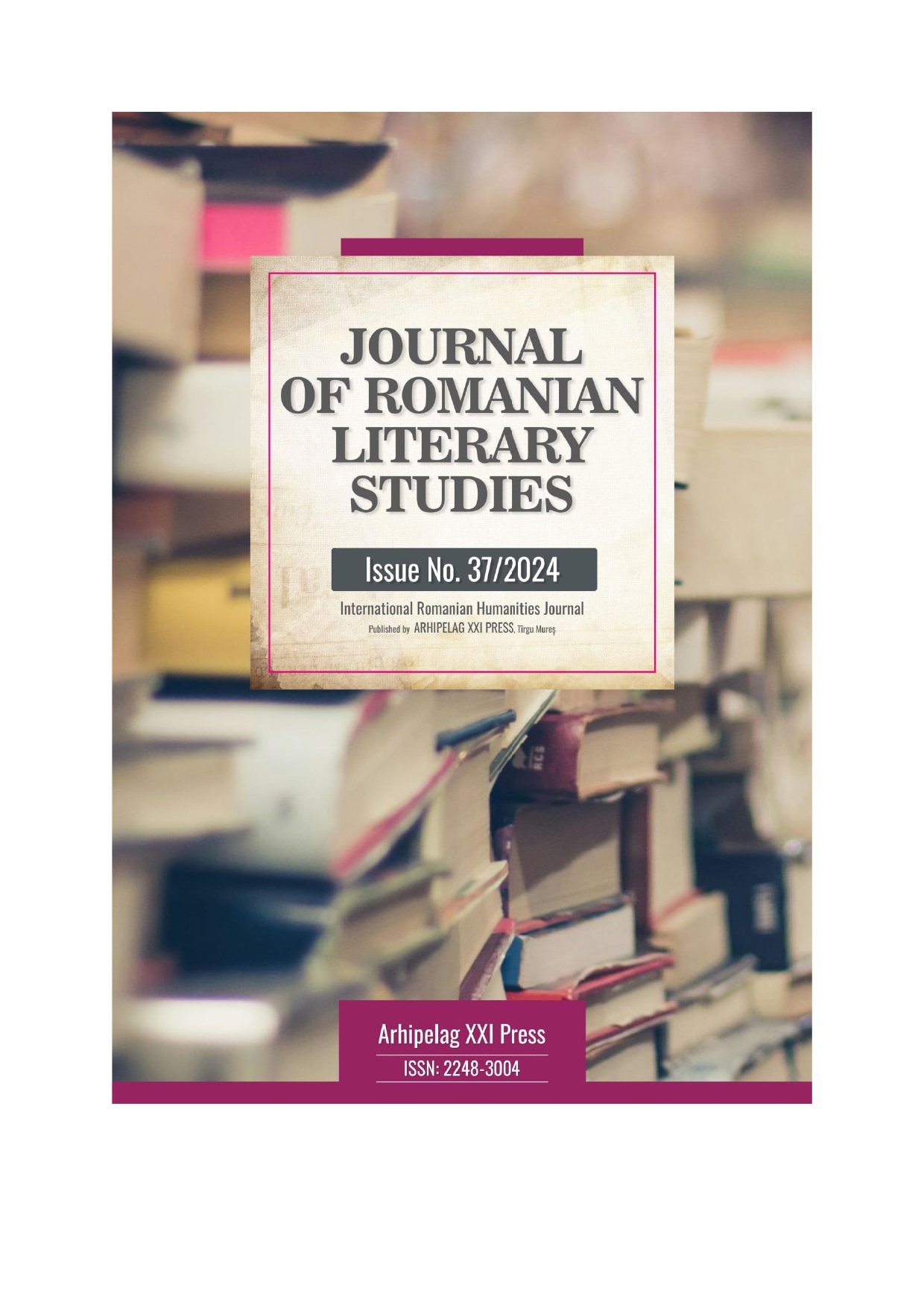
Labor market is a complex and organized system having a special characteristic – proximity, meaning that labor market services are organized as close to the human capital as possible. At the same time, labor market is developing and functioning in a complete lack of harmony with the educational system, identifying disadvantageous moments regarding training, development and keeping the human capital connected with the national economy.Discrimination in Romania, for a long time, has not been a topic open for debate or research field worthy to take into consideration. During the post-revolutionary period some steps were taken but ample research started only after joining the EU.
More...
The piracy against ships is one of the problems in the shipping sector worldwide. Due to the fact the survival resources became problematic for the human kind on the daily basis, more threats that were looming have emerged. One of them is the safety of ships on the navigation routes on world’s seas and ships. On the commercial routes there are zones of armed conflicts between old combatants, and zones where the safety of ships is endangered by different groups of mercenaries who, having no considerations for anything attack and take hold of merchant ships crossing their territory.
More...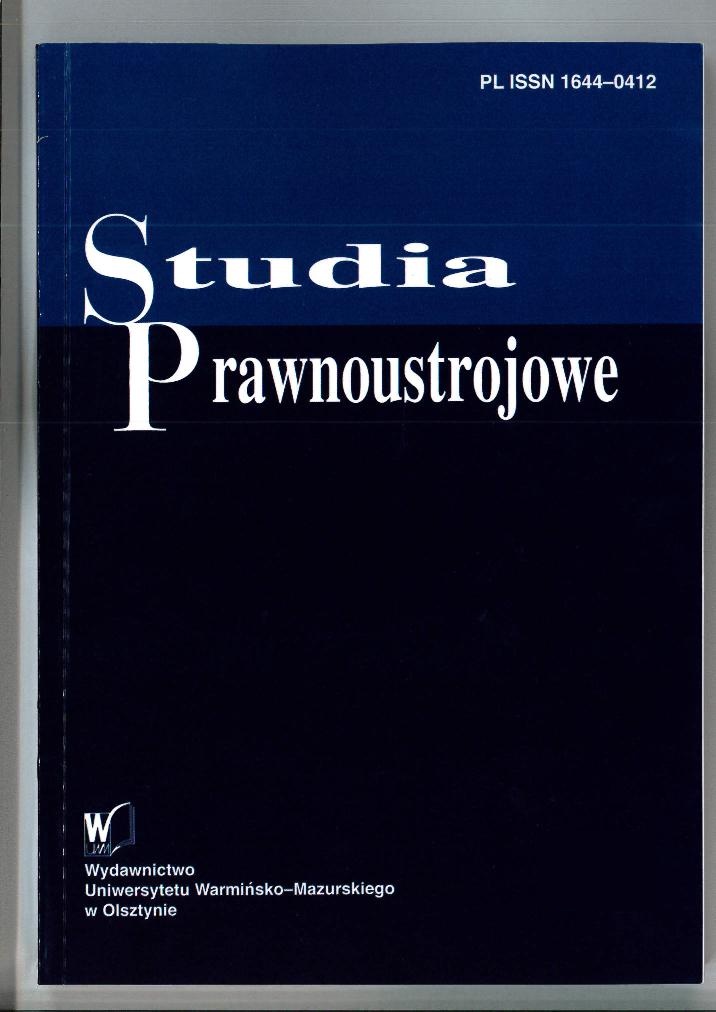
This article examines the academic work of Zygmunt Ziembiński, a prominent legal theorist who wrote during the latter half of the twentieth century. His concepts remain a significant aspect of legal doctrine. Although he passed away some time ago, his works continue to provide relevance and value for modern legal research. The primary aim of this article is to emphasise the necessity of conducting a more profound examination of Z. Ziembiński’s scientific heritage and to determine the best research methodologies for this pursuit. It is especially critical to comprehend the sociological facets of his accomplishments, which are often ignored or undervalued. By delving into the origins and underlying factors behind the adjustments in Z. Ziembiński’s implementing sociological research in jurisprudence, this investigation uncovers the uncharted facets of this academician’s work. Scrutinising Z. Ziembiński’s scholarly heritage has immense scientific potential, as it facilitates a deeper comprehension of his legal theory, while also enabling an evaluation of its applicability in the current legal and social milieu. Further research is essential to fully comprehend the noteworthy contributions of this exceptional legal theorist to the advancement of Polish legal theory and the sociology of law.
More...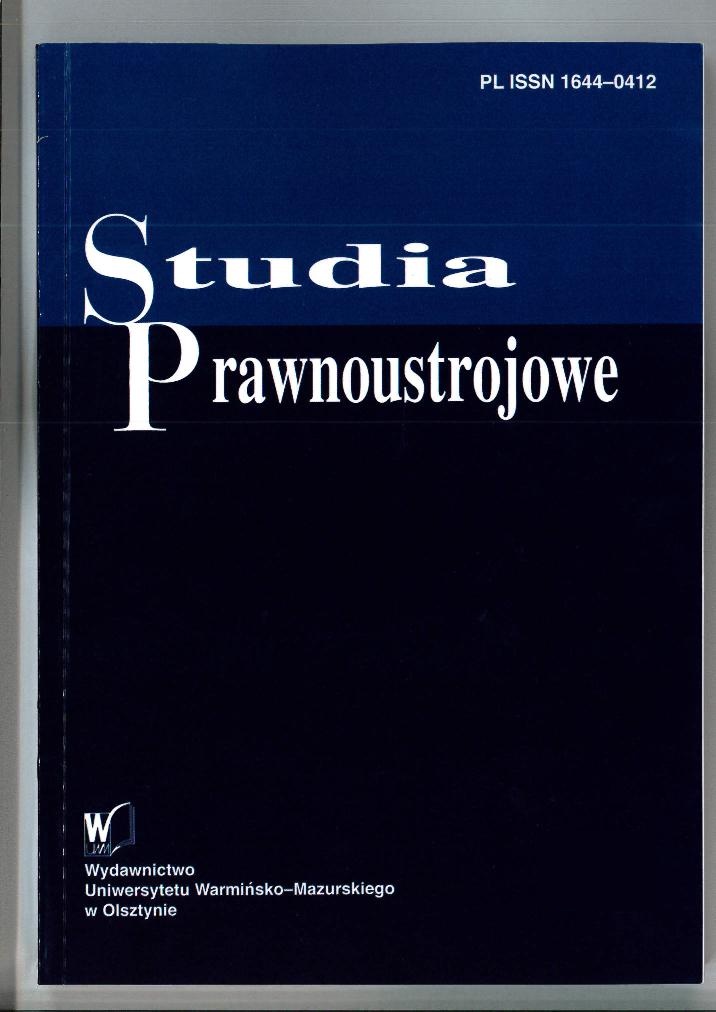
Abortion law is continually a controversial topic – in legal and social terms. Domestic laws provide various grounds for legal termination of pregnancy, which – usually – are divided into medical, criminological, eugenic and social. The subject of this paper is social reasons as a prerequisite of legal termination of pregnancy. This study aimed to prove that this premise is diversified. The research hypothesis assumed in this study was formulated as follows: The social prerequisite of abortion may – depending on the legal system – have a narrower or wider scope and is not equivalent to the termination of pregnancy “on demand”. To verify the research hypothesis, a comparative research method was used. The main conclusion of this paper is that the social reason for termination of pregnancy depends on the legal system and may have a narrower or wider scope and is not equivalent to the termination of pregnancy “on request”.
More...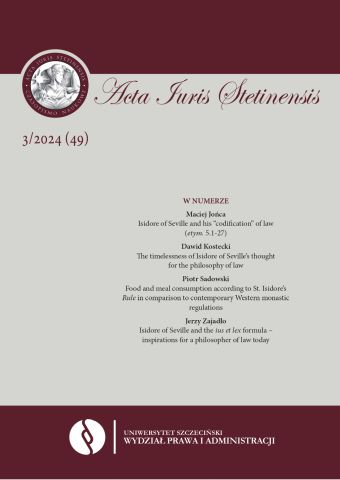
The aim of this article is to present the incredible character of St. Isidore of Seville and his teachings, especially in the context of the subject matter of witnesses in a trial, especially in its juridical and theological meaning. He was regarded as one of the most important scholars of Late Antiquity and the beginnings of Early Middle Ages. In his tireless scholarly and pastoral mission, referring to ancient cultural and scholarly tradition, he propagated the need for constant development of one’s knowledge and reason. He believed that human ignorance is the cause of many earthly and eternal misfortunes. In his treaties, addressed to legislators and rulers, he reminded them about the role of witnesses in a trial and the need to observe the ancient two-witness rule and consistent testimony as a guarantee of justice and truth.
More...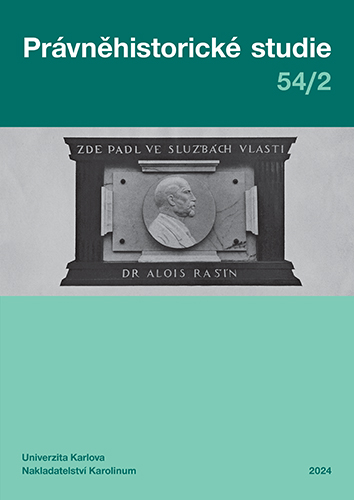
The article concerns the origins of the well-known classification of corporeal and incorporeal things in Roman law, which follows from the development visible in the legal sources from Institutes of Gaius to the codification of the emperor Justinian. The wide range of non-legal sources dealing with the classification, mostly the philosophical works, from authors as Cicero, Seneca, Gellius, or Lactantius, is taken also into account. Two types of the classification based on the corporeality of things arise from all the analyzed texts. The first one uses the terms corporeal and incorporeal thing, but the legal sources, except the Institutes of Gaius and apart the non-legal ones, almost avoid it. The second one divides things with corpus and the ones consisting of rights and it is represented in the text of Ulpianus or Hermogenianus as well as in several post-classical legal sources. Nevertheless, the codification of the emperor Justinian adopts the formulation according to Gaius, whose proximity to the philosophy categories can be observed so the classification of the corporeal and incorporeal things.
More...
The aim of this study is to discuss information on the origins of natural law (ius naturale) in Etymologiae (Etymologiarum sive Originarum libri XX) written by St. Isidore of Seville (d. 636). Such a choice of the subject matter seems reasonable mainly because research on Christian concepts of natural law as a rule places the study of St. Thomas Aquinas’s natural law theory as its focal point. Previous Christian concepts are only briefly touched upon. Meanwhile, they have immense historical significance that have determined the entire Christian reflection on the idea of natural law since as early as the 13th century. The research allows a conclusion that the definition of natural law constructed by St. Isidore of Seville, along with the examples presented in his Etymologiae, is an exceptional creation that has no clear archetype in juridical and non–juridical sources. It quite clearly presents elements taken from Ulpian. However, the very essence of natural law as a normative system, that connects all people (not people and animals) due to their “natural instinct” (instinctus naturae) and that is independent of the will of the positive legislator, remains under a marked influence of the Christian thought.
More...